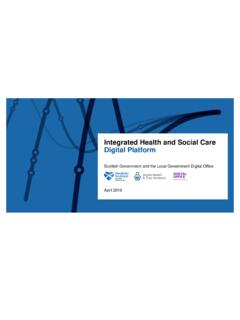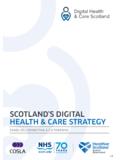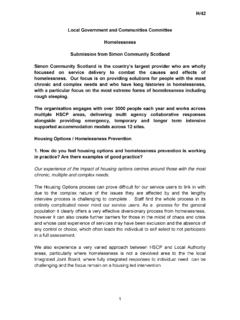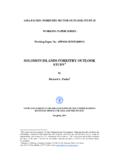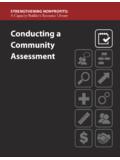Transcription of DIGITAL HEALTH & CARE IN SCOTLAND
1 REPORT OF THE EXTERNAL EXPERT PANELDIGITAL HEALTH & care IN SCOTLAND Foreword - Professor David W Bates MD MSc, Chair, External Expert Panel At the invitation of the Cabinet Secretary for HEALTH and Sport, Shona Robison MSP, an external, independent panel of UK and international experts was asked to advise the Scottish Government on how DIGITAL technology can support SCOTLAND s aim for high quality HEALTH and social care services with a particular focus on prevention, early intervention and supported self-management. This is a timely request as SCOTLAND has an opportunity to emerge as a global leader in using DIGITAL technology to improve HEALTH and social care delivery and outcomes.
2 SCOTLAND has many advantages. It is an international leader in the policy drive to integrate HEALTH and social care , built around a single strategic 2020 Vision of shifting the balance of care from the acute to the community sector. Its size is sufficiently manageable yet large enough to demonstrate impact, and its leadership is suitably enlightened such that it is possible to reach cross-sectoral consensus in the national interest. A number of successes have been achieved in specific areas, including using technology enabled care (TEC) in prevention and early intervention (for example, in the management of hypertension); having a single patient identifier across HEALTH (the Community HEALTH Index (CHI) number); the establishment of the Scottish Wide Area Network (SWAN) single broadband; the NHS National Services SCOTLAND (NSS) Data Warehouse; and the Picture Archiving and Communications System (PACS) national radiology network.
3 Also noteworthy is SCOTLAND s evaluation of the impact of the smoking ban in public places, which has demonstrated to the world the considerable potential of interrogating routine national datasets to evaluate national public HEALTH policy decisions. If SCOTLAND is to become a true learning HEALTH and care system , DIGITAL technology and data science will be a key piece of the infrastructure. There are a number of places where progress is needed. For example, citizens do not routinely have online access to personal HEALTH and care records (PHCRs), and they cannot routinely make appointments electronically. While electronic HEALTH records (EHRs) are used in general practice, levels of adoption of EHRs in hospitals is patchy, and too many processes remain paper-based.
4 In general practice, much of the technology is too old, and not all practices have high-speed internet connections. Practitioners need to use multiple systems to do their day-to-day work, which slows them unnecessarily and is frustrating, particularly where single sign-on is unavailable. Social care providers are generally not yet digitally connected. Social care users generally do not have access to personal records, and there is limited interoperability between electronic records from different providers or authorities. Despite the size of SCOTLAND , significant local variation in the application of individual systems persists, with only a limited number of national applications.
5 While the cloud is used for centralised hosting of national applications joined up by a common broadband network (SWAN) where that is available, it is not routinely used to house electronic data. Ensuring that the technical infrastructures in HEALTH and care provide robust security protection of information is a real and recognised challenge as we move towards greater use of DIGITAL and outward facing systems, for example with citizen portals and mobile apps. 1 We make a series of recommendations in this report regarding how SCOTLAND can strategically move forward. In doing so, we build on working examples from other parts of the world that we believe can and should be considered for implementation in SCOTLAND .
6 These are described in detail later, but some of our key recommendations are to offer every citizen a personal HEALTH and care record, and to make it easier to carry out tasks like making appointments with any part of the system , which today is unnecessarily onerous. EHRs which work well should be the norm in primary, community and hospital services. Social care needs to be completely integrated into this and brought into the core DIGITAL exchange. To enable this broad data exchange, it will be critical to have a framework including nationally agreed standards. High-speed connections and use of the cloud will be critical.
7 Issues of upgrades and security will need to be addressed. What is clear is that any effective strategy needs to be couched in terms of transforming services rather than digitising services, and needs to look beyond existing services provided by the NHS and by social care for answers. So how might things work? Here is one example: Isla MacCarthy is a 67 year-old woman with hypertension and diabetes. She lives alone with little family support but has a strong social network in her community. She has been managing her conditions together with her general practitioner (GP), and regularly checks her blood pressure and blood sugars.
8 She has recently changed her diet and lost weight, and both of these have been much better than they were, in part because she has been tracking them through her PHCR, following suggestions she has received through her PHCR, and the home monitoring she carries out. Today, she has had a bad cold and has found that her blood pressure is much higher than it was the day before. Data from her monitors are regularly, automatically transmitted to her GP medical record. Instead of calling her general practice, she sends a text to her HEALTH coach at the practice, and quickly gets a call back; her coach finds out that she is taking a new over-the-counter cold medicine which likely caused the spike in her blood pressure.
9 She stops it and instead of spending the afternoon waiting at the doctor s surgery, is able to go to pick up her grandchild after school. When her GP prescribes medications for her, the choice is guided by decision support related to her genome which she has had sequenced as well as her clinical characteristics. Her record is housed in the cloud and data exchange across providers and HEALTH Boards has become the norm, which means that no matter whether she sees a specialist in Aberdeen or Glasgow, it will be available to them. She is also delighted to be participating in a SCOTLAND -wide study of hypertension, and regularly communicates with a network of other patients with similar conditions which give her ideas about how to manage her diet among many other issues.
10 In this document, we make a series of recommendations that will enable SCOTLAND to achieve this vision, along with many other advances. 2 Executive Summary The goal of this report is to enable SCOTLAND to capitalise on major developments in DIGITAL technology and data science to improve the HEALTH and social well-being of the Scottish population. We also seek to position SCOTLAND as a world leader in digitally enabled HEALTH and care . This will involve many categories and dimensions of HEALTH , including mental, physical, and social HEALTH to name a few. SCOTLAND is already an international leader in patient safety and in technology enabled care (TEC), but our hope is that by following these recommendations it can also become an international leader in DIGITAL HEALTH and social care more broadly, in delivery of care and in service transformation among many other areas.
